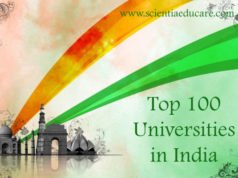
COIMBATORE: The popularity of integrated courses is high among students abroad and now they are gaining acceptance here as well.
Apart from the engineering-management combo, there are undergrad-postgraduate programmes in medical nanotechnology, big data management, mathematics etc on offer.
The trend may well catch on provided universities and colleges tailor courses to suit the needs of potential recruiters or to develop expertise in specific fields.
Sastra University, for instance, has an MTech in medical nanotechnology, which is a five-year integrated programme.
Vellore Institute of Technology, Amrita University, Anna University and other state varsities have integrated programmes in niche areas.
The choice ranges from big data management to English and mathematics. But the danger is the idea of an integrated programme may turn into a fad which is copied with no thought for its consequences.
Mallik Sundharam, regional director, ELS Education Services, said, “The need for integrated programmes is rising. While universities are coming up with programmes to suit Indian markets, they are also adapting to foreign cultures…I have seen institutions in Bengaluru adapting to international standards. And their performance is pleasing.”
Some institutions are certainly analysing market and industry requirements before designing such courses. “Syllabus of the two courses are integrated carefully, making sure no essentials are missed out. Subjects are added or deleted based on market needs,” Mallik said. “For example, a blend of computer science and electronics is preferred by many students as it helps them understand industry trends better.”
S Vaidhyasubramaniam, dean, planning and development, Sastra University said, “Integrated courses come with innovation, but the best innovation in all these courses is time. A student completes both bachelors and masters in one programme.” He said universities and institutes are also trying to innovate in a way that students, who pursue integrated programs, can thereafter adapt to research through a PhD.
However, there are some drawbacks as well to the business of integrating undergraduate and postgraduate courses. One that most universities face is the recruiter’s apprehension. A senior professor from a deemed university said, “Most universities face the challenge of convincing recruiters to pick integrated students. Recruiters prefer plain graduates as they are easy to train and have to paid less.” On the other hand, students graduating with an integrated programme may well seem overqualified for a trainee’s job in certain fields.
Some career consultants say an integrated engineering-management programme has still not caught the imagination of students. “Top scorers would always like to pursue a management degree at a better university,” said consultant Jayaprakash Gandhi said.
He added that at the undergraduate level, many students don’t like getting tied down to an integrated programme as they feel it would limit their career choices immediately after class XII. “Also, the best B-schools across the globe prefer students with work experience. That is because historically MBA has been viewed a professional qualification for future managers,” Gandhi said.
A senior academician, who did not want to be named, pointed out that some integrated courses are only created to accommodate more students. “The idea is to admit more students every year. When students do not get admission into top courses, these integrated courses are their second option,” he said. One of the deemed universities admitted that some of their integrated programmes are not attracting students.














